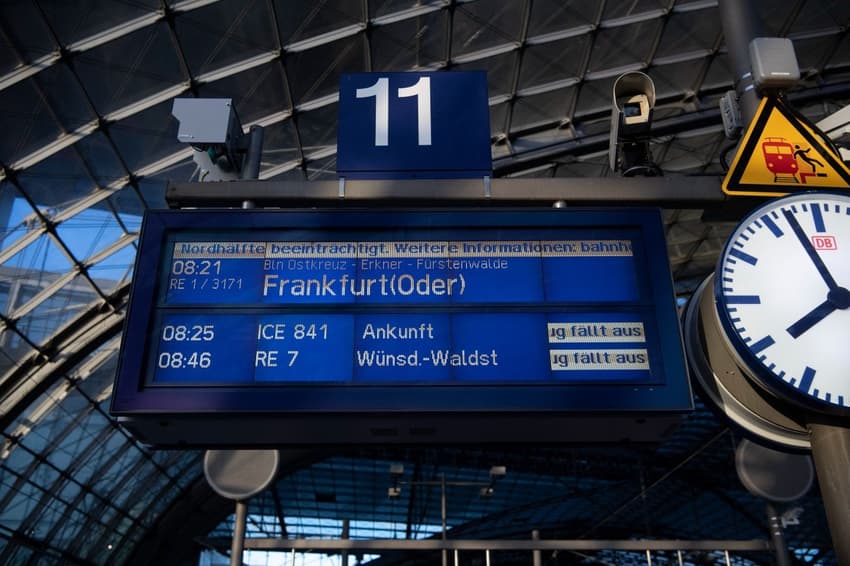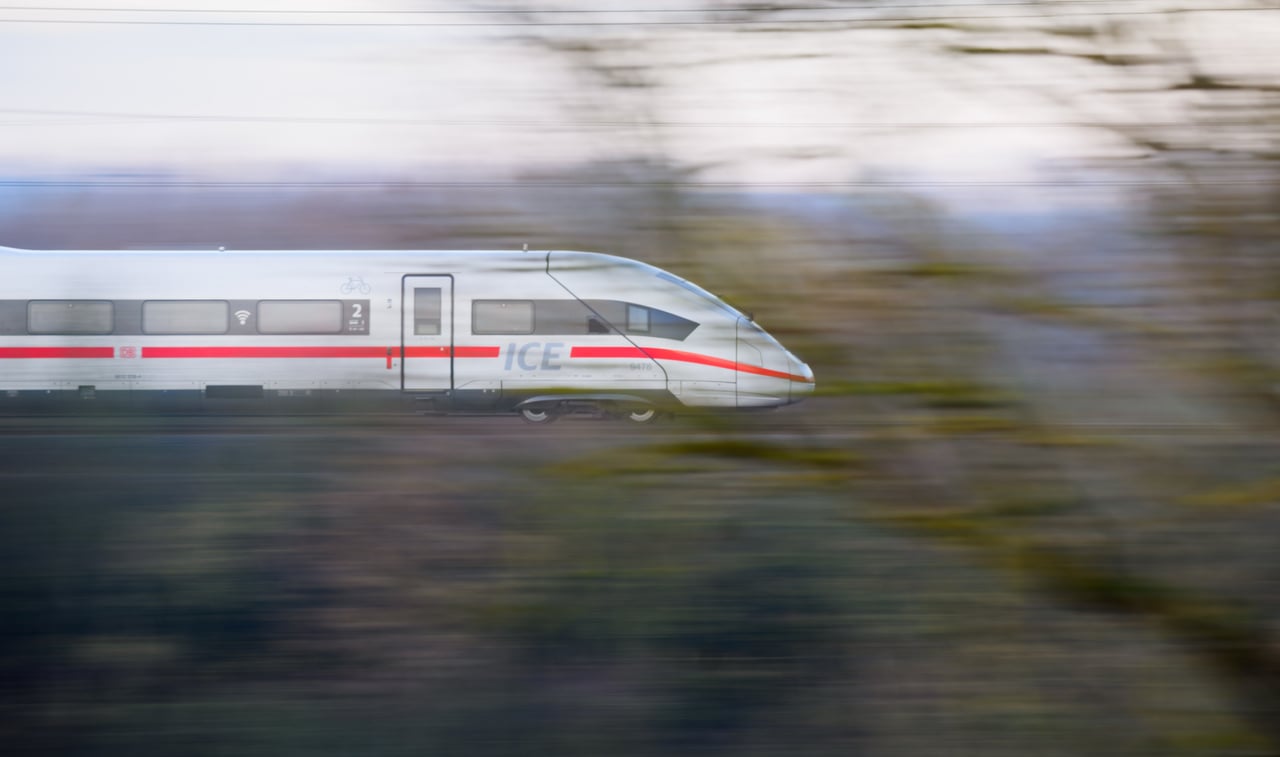'2024 a turning point': When will Germany's rail network run on time?

Transport Minister Volker Wissing has claimed that late 2024 will be a turning point for Germany's unpunctual rail network. But can Deutsche Bahn really turn itself around in just over a year?
Germany's rail network is running late - and not just when it comes to its daily schedule. In the first six months of 2023, barely two-thirds of Deutsche Bahn trains arrived at their destination on time, with the company reporting an abysmal 68.7 percent punctuality rate. The target for the year as a whole is more than 70 percent punctuality.
But according to experts, the delays stretch far beyond the individual connections: Germany's rail infrastructure is creaking at the joints and has been in dire need of an upgrade for several years now.
In a recent interview with DPA, Transport Minister Volker Wissing (FDP) claimed that renovations on a key piece of track would lead to a major improvement in punctuality by the end of next year.
"The poor condition of our main routes is the most urgent problem that we are tackling now," he explained. "As soon as the Riedbahn between Frankfurt and Mannheim is rehabilitated, which will be before Christmas next year, there will be the first 'high-performance corridor' in Germany. From then on, things will already be better."
The route between Frankfurt and Mannheim has become something of a problem zone on the German rail network.
Every seventh train in Germany has to pass through this busy stretch of track, meaning problems in this area trigger a domino effect that disrupts the flow of daily traffic.
READ ALSO: Why is Deutsche Bahn seeing a record high number of delays this year?
"On the Riedbahn, we now have at least one operational disruption per day," Wissing said. "With more than 300 passenger and goods trains a day, this has a huge impact on operations throughout Germany."
In the large-scale project to revamp key stretches of Germany's 33,000km rail network, the first step will be the Riedbahn.
Renovations in 2024
From July 15th next year - just after the European Football Championships in Germany - the direct route between Frankfurt and Mannheim will close for six months.
During this time, pretty much the entirety of the Riedbahn will be ripped out and redone: 152 switches, 140 kilometres of overhead lines, and around 117 kilometres of track.
"At maximum speed, this will bring us permanently improved punctuality and improved train operations," Wissing said.
While the renovations are taking place, passengers looking to travel between the two major transport hubs will need to take alternative routes that will either run to the west via Mainz and Worms or to the east via Darmstadt and Bensheim.
Describing the process of closing key routes for renovation, Wissing reached for a medical metaphor.
"You have to think of it like when you operate on a major artery in the body and you clamp it off for that," he said. "For this you have to put a bypass beforehand, otherwise it does not lead to healing, but to the patient collapsing. That's why now, before we close the first corridor, we have to put in bypasses."
READ ALSO: Could Germany's newest and fastest ICE train put an end to delays?
In other words, before major lines like the Riedbahn could be closed, the secondary lines around it had to be brought up to standard and rail replacement routes had to be established.
The ultimate goal is to deliver a high-performance rail network by 2030 with general renovations on 40 lines across Germany. This would mean that punctuality would be improved, but also that more trains could run on the network.

A Deutsche Bahn ICE train travels along a railway line in the Hanover region. Photo: picture alliance/dpa | Julian Stratenschulte
After the Riedbahn, the next phase will be two primary lines between Berlin and Hamburg in northern Germany and between Emmerich and Oberhausen in North Rhine-Westphalia.
Alongside this, the government is working on a longer-term project known as the Deutschlandtakt: a new timetable that aims to create more rapid and seamless cross-country transport.
Specifically, long-distance traffic between the metropolitan regions will be timed more closely, while trains between the largest cities will run every half hour. These should arrive at central stations at approximately the same time and depart again shortly afterwards. But this modified timetable may not arrive for quite some time.
READ ALSO: Why Switzerland beats Germany for reliable trains
"There is no final date for this," Wissing said. "We are continuously working on adapting the infrastructure to the timetable needs. Routes are constantly being added in stages. Each stage brings new service leaps and significant timetable improvements.
"The Deutschlandtakt system is a permanently ongoing project."
Comments
See Also
Germany's rail network is running late - and not just when it comes to its daily schedule. In the first six months of 2023, barely two-thirds of Deutsche Bahn trains arrived at their destination on time, with the company reporting an abysmal 68.7 percent punctuality rate. The target for the year as a whole is more than 70 percent punctuality.
But according to experts, the delays stretch far beyond the individual connections: Germany's rail infrastructure is creaking at the joints and has been in dire need of an upgrade for several years now.
In a recent interview with DPA, Transport Minister Volker Wissing (FDP) claimed that renovations on a key piece of track would lead to a major improvement in punctuality by the end of next year.
"The poor condition of our main routes is the most urgent problem that we are tackling now," he explained. "As soon as the Riedbahn between Frankfurt and Mannheim is rehabilitated, which will be before Christmas next year, there will be the first 'high-performance corridor' in Germany. From then on, things will already be better."
The route between Frankfurt and Mannheim has become something of a problem zone on the German rail network.
Every seventh train in Germany has to pass through this busy stretch of track, meaning problems in this area trigger a domino effect that disrupts the flow of daily traffic.
READ ALSO: Why is Deutsche Bahn seeing a record high number of delays this year?
"On the Riedbahn, we now have at least one operational disruption per day," Wissing said. "With more than 300 passenger and goods trains a day, this has a huge impact on operations throughout Germany."
In the large-scale project to revamp key stretches of Germany's 33,000km rail network, the first step will be the Riedbahn.
Renovations in 2024
From July 15th next year - just after the European Football Championships in Germany - the direct route between Frankfurt and Mannheim will close for six months.
During this time, pretty much the entirety of the Riedbahn will be ripped out and redone: 152 switches, 140 kilometres of overhead lines, and around 117 kilometres of track.
"At maximum speed, this will bring us permanently improved punctuality and improved train operations," Wissing said.
While the renovations are taking place, passengers looking to travel between the two major transport hubs will need to take alternative routes that will either run to the west via Mainz and Worms or to the east via Darmstadt and Bensheim.
Describing the process of closing key routes for renovation, Wissing reached for a medical metaphor.
"You have to think of it like when you operate on a major artery in the body and you clamp it off for that," he said. "For this you have to put a bypass beforehand, otherwise it does not lead to healing, but to the patient collapsing. That's why now, before we close the first corridor, we have to put in bypasses."
READ ALSO: Could Germany's newest and fastest ICE train put an end to delays?
In other words, before major lines like the Riedbahn could be closed, the secondary lines around it had to be brought up to standard and rail replacement routes had to be established.
The ultimate goal is to deliver a high-performance rail network by 2030 with general renovations on 40 lines across Germany. This would mean that punctuality would be improved, but also that more trains could run on the network.

After the Riedbahn, the next phase will be two primary lines between Berlin and Hamburg in northern Germany and between Emmerich and Oberhausen in North Rhine-Westphalia.
Alongside this, the government is working on a longer-term project known as the Deutschlandtakt: a new timetable that aims to create more rapid and seamless cross-country transport.
Specifically, long-distance traffic between the metropolitan regions will be timed more closely, while trains between the largest cities will run every half hour. These should arrive at central stations at approximately the same time and depart again shortly afterwards. But this modified timetable may not arrive for quite some time.
READ ALSO: Why Switzerland beats Germany for reliable trains
"There is no final date for this," Wissing said. "We are continuously working on adapting the infrastructure to the timetable needs. Routes are constantly being added in stages. Each stage brings new service leaps and significant timetable improvements.
"The Deutschlandtakt system is a permanently ongoing project."
Join the conversation in our comments section below. Share your own views and experience and if you have a question or suggestion for our journalists then email us at [email protected].
Please keep comments civil, constructive and on topic – and make sure to read our terms of use before getting involved.
Please log in here to leave a comment.